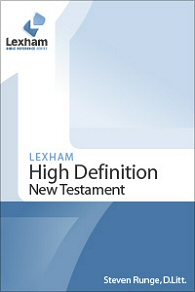The New Testament writers used a variety of literary and grammatical devices to help guide the reader. Some of these devices were intended to attract attention to important information, while others served to push less-important information into the background. Some were used simply to grab your attention, alerting you that something important or surprising was about to happen.
9 The next day, as they were on their journey and approaching the city, Peter went up on the housetop about the sixth hour to pray.
10 And he became hungry and wanted something to eat, but while they were preparing it, he fell into a trance
11 and saw the heavens opened and something like a great sheet descending, being let down by its four corners upon the earth.
12 In it were all kinds of animals and reptiles and birds of the air.
13 And there came a voice to him: “Rise, Peter; kill and eat.”
Runge, S. E. (2008–2014). The Lexham High Definition New Testament: ESV Edition (Ac 10:9–13). Lexham Press.
Faithlife Study Bible (FSB) is your guide to the ancient world of the Old and New Testaments, with study notes and articles that draw from a wide range of academic research. FSB helps you learn how to think about interpretation methods and issues so that you can gain a deeper understanding of the text.
10:9–24 God gives Peter a vision that prepares him for the arrival of the messengers from Cornelius (vv. 7–8). The vision’s meaning and ot allusions reinforce the universal cultural scope of the Church’s message and mission.
10:9 sixth hour At this time Peter would have been hungry and waiting for his midday meal to be ready (v. 10), an appropriate time for a vision involving food.
10:11 heaven opened Compare Ezek 1:1; Rev 19:11.
10:12 animals Luke, the narrator, probably intends to convey that virtually every sort of creature was present.
Barry, J. D., Mangum, D., Brown, D. R., Heiser, M. S., Custis, M., Ritzema, E., Whitehead, M. M., Grigoni, M. R., & Bomar, D. (2012, 2016). Faithlife Study Bible (Ac 10:11). Lexham Press.
The Lexham Context Commentary: New Testament surveys each book of the New Testament at several levels—Book, Division, Section, Pericope, Paragraph, and Unit—providing contextually appropriate commentary on each level. The reader of the commentary can easily ascertain the contextual importance of any larger section, or pericope, or even a particular verse of Scripture.
Peter’s Vision (10:9–16)
This paragraph describes Peter’s strange vision about unclean animals, descending from heaven in a sheet-like object, that Peter is commanded to eat (10:9–13). When he refuses two commands, God responds with a mysterious saying about how what is created clean cannot be called profane (10:14–16).
10:9 This verse states that Peter climbs on a roof to pray at about noon just as the delegation of three men that Cornelius sent to Joppa to get Peter is approaching the city (10:7–8).
10:10 Luke describes what happens to Peter while he is on the rooftop praying (10:9): Peter apparently is on the roof so long that he becomes hungry and requests a meal. While waiting for his lunch, he has a dream in the middle of the day (10:9). It was in the afternoon on the previous day that Cornelius saw his vision (10:3).
10:11 Luke describes the dream that Peter has (10:10): what Peter sees in his dream appears to be a large four-cornered sheet descending from heaven and spread out on the ground, perhaps like a picnic blanket.
10:12 This verse reveals the contents of the sheet that is spread on the earth in Peter’s dream (10:11): the sheet contains every category of animals—four-footed animals, reptiles, and flying birds (10:12); presumably Peter sees clean and unclean animals as delineated in the Levitical culinary laws (10:14; Lev 11:1–47).
10:13 This verse continues to describe Peter’s dream on the rooftop after he sees the sheet full of animals (10:11–12): a voice commands a hungry Peter to kill and eat any of the animals he sees in the sheet.
Mangum, D., ed. (2020). Lexham Context Commentary: New Testament (Ac 10:9–16). Lexham Press.


